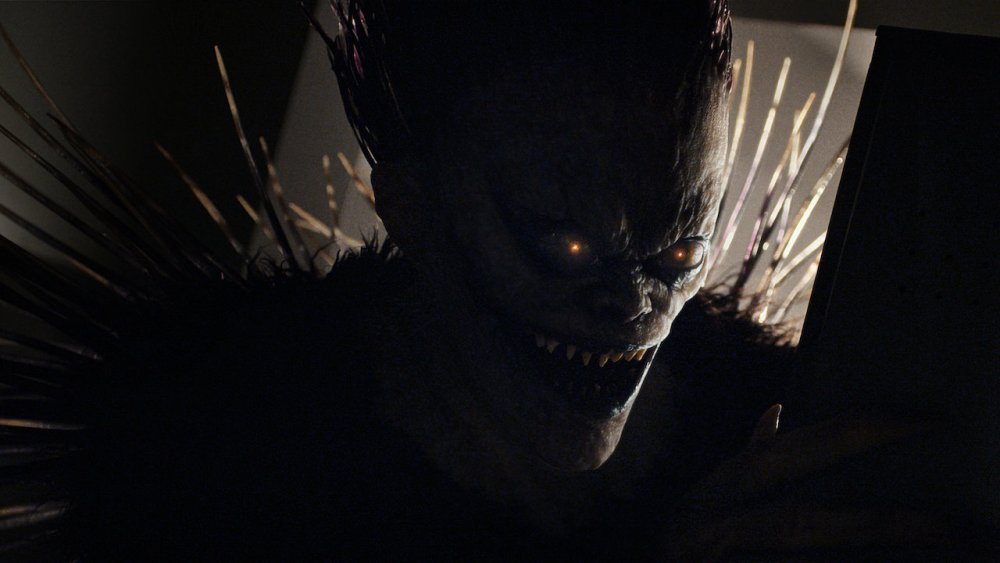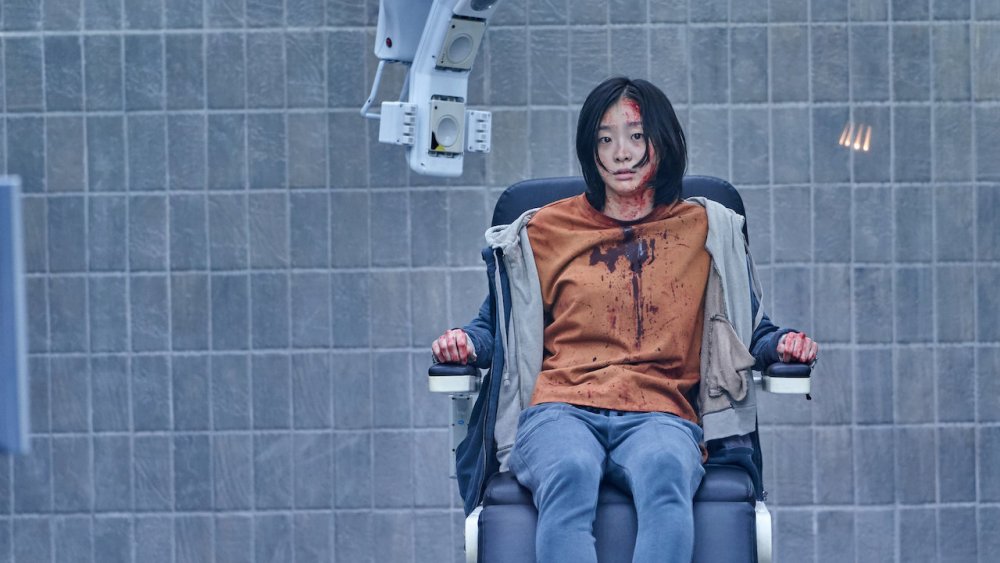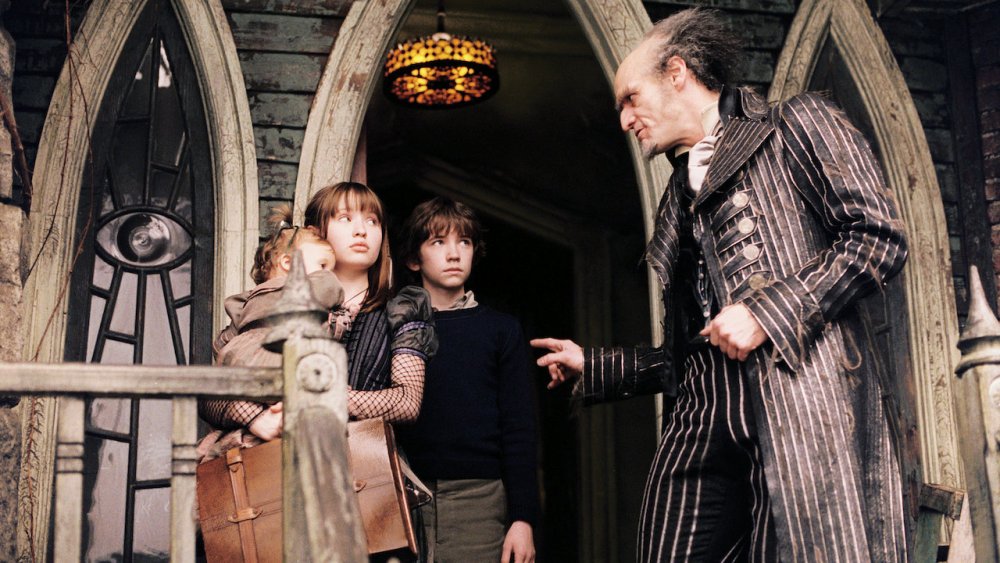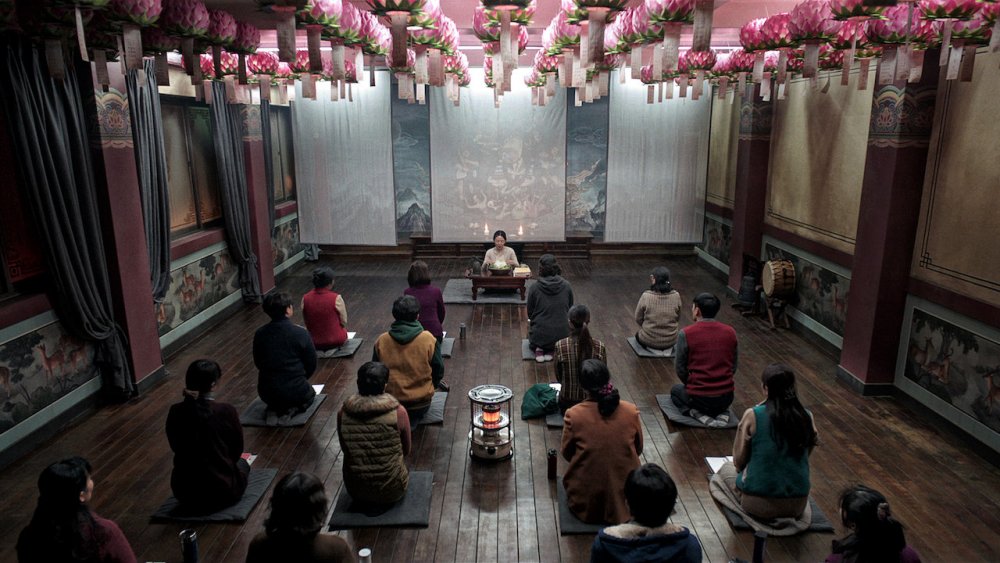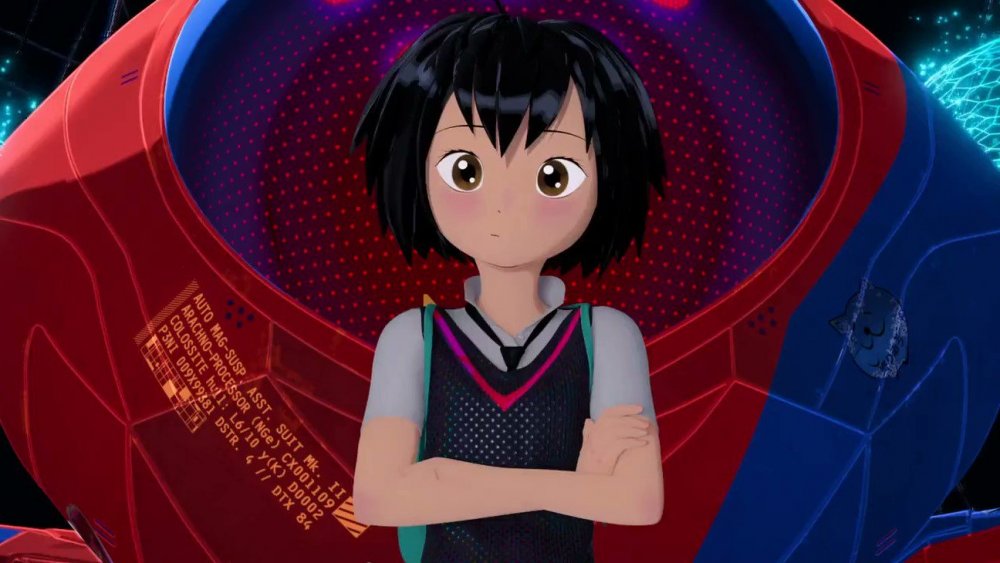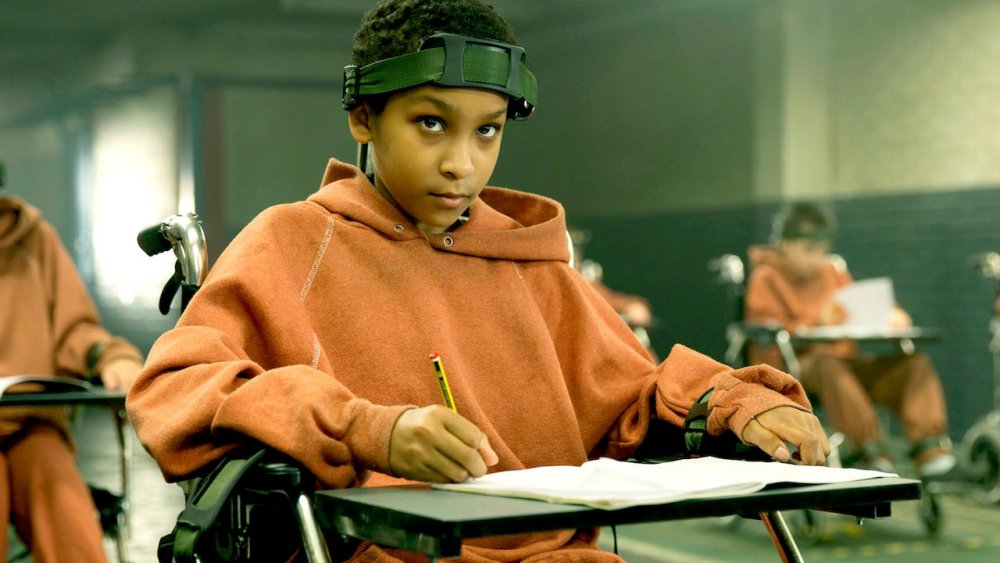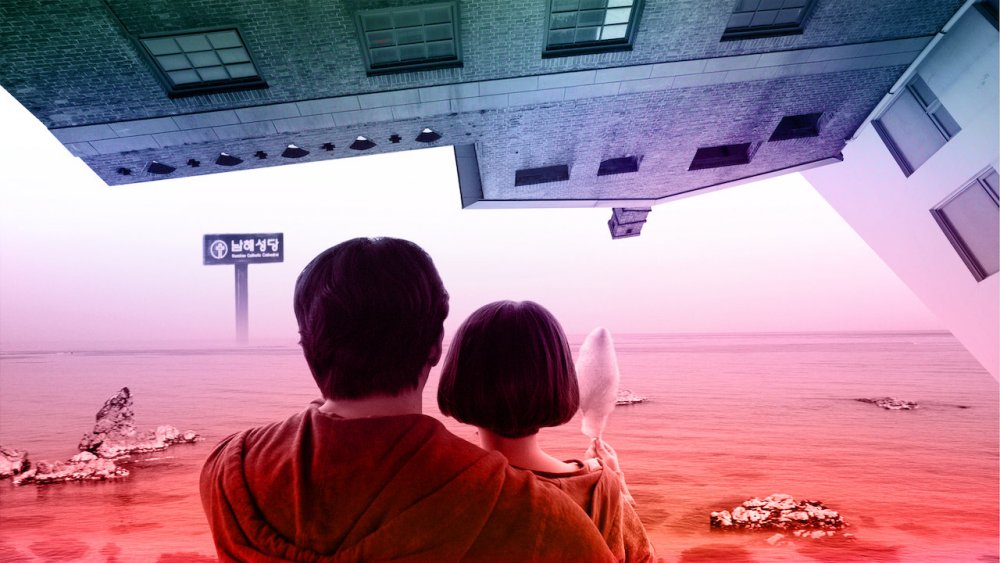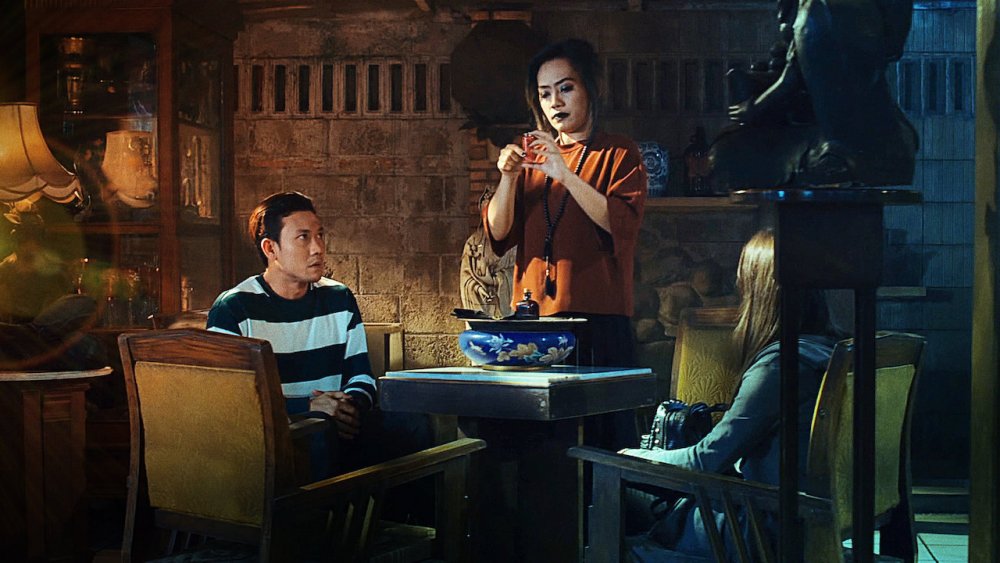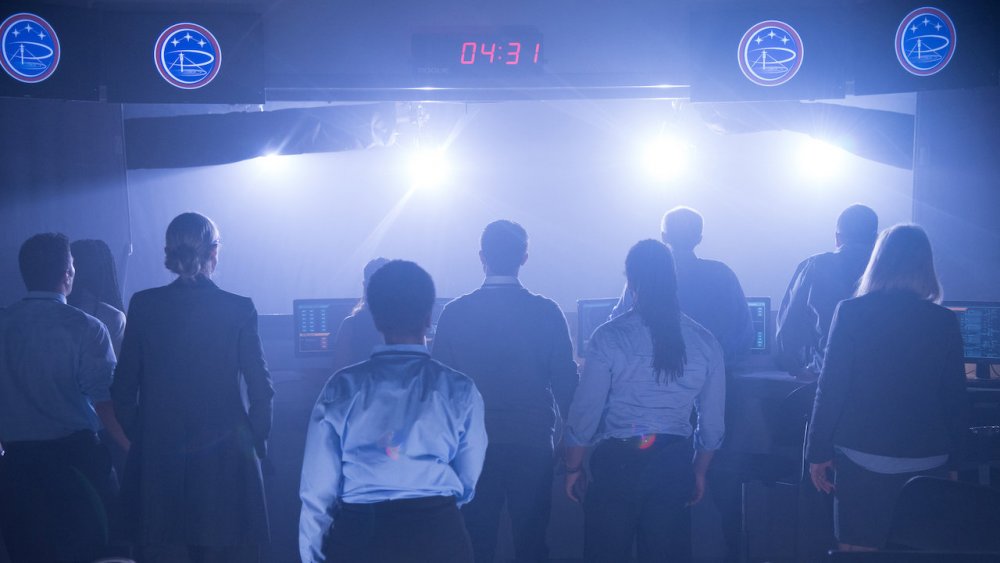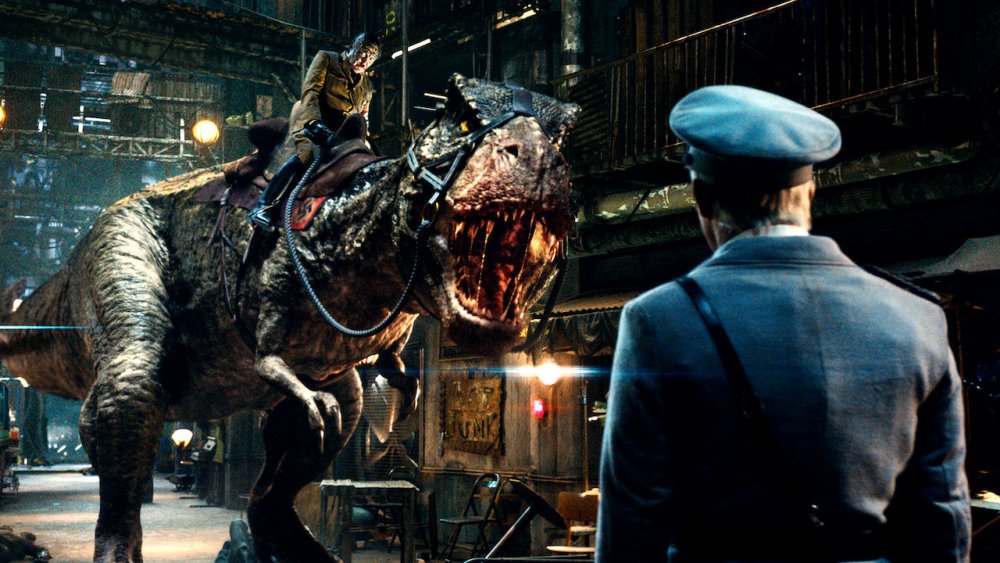Films To Watch If You Love The Umbrella Academy
This content was paid for by Netflix and created by Looper.
The Umbrella Academy is one of a kind. Like the Gerard Way and Gabriel Ba comic it's based on, it's the perfect mix of quirky superhero action, true-to-life adult pathos, oddball worldbuilding, and apocalyptic mystery. It's funny. It's exciting. It'll tug at your heartstrings. Quite simply, there's nothing else like it.
But The Umbrella Academy doesn't have a monopoly on the trials of teens with superpowers. It's not the only place where you'll find tension between super-powered siblings, or see the lifelong trauma that results from lackluster parenting. It's far from the only show or movie to play with the idea that special abilities are more of a curse than a gift, or that uses a sci-fi set-up as an excuse to both delve into deep-seated psychological issues while crafting a world that's certifiably insane.
These movies play with many of the same tropes as The Umbrella Academy and contain the same playful creativity that makes the show so special, all while doing their own thing. If you want to see The Umbrella Academy's biggest ideas explored in cool, different ways, these are the movies you should probably check out next.
Death Note
Light Turner has a problem. See, a few days ago, he found a mysterious notebook with a special power: If he writes a person's name in the book while picturing their face, they'll die. And he's used it. A bunch of times. First, Light offed the local bully. Next, he took out the man who killed his mom. After that, he began killing rapists and murderers and pedophiles all over the world while using the alter-ego Kira, who's now being worshipped like a god.
But the Death Note comes with side effects. For one, a demon named Ryuk haunts Light at every step. His new girlfriend, Mia, is beginning to get a little too invested in Kira's crusade, and pushes Light to overstep his (admittedly fluid) boundaries. Light's father is hunting Kira, as is a mysterious masked man known only as L, who happens to be one of the best detectives on the planet.
Death Note, which is based on an exceptionally popular manga and anime series, has everything The Umbrella Academy fans love. It's a pitch black fantasy story about a young adult trying to control some very weird powers. It's full of oddball world-building; by the time we learn that L was experimented on as a child as part of a government program designed to produce world-class detectives, we're well into The Umbrella Academy territory. And most of all, it's all about trauma and facing consequences. While it has a global scope, it's really a small and intimate story about the relationships between just a few people.
The Witch: Part 1. The Subversion
You don't have to look too hard to notice that there's a lot of X-Men in The Umbrella Academy's DNA. A reclusive and eccentric billionaire recruits an army of super-powered teens and opens a school where they learn how to be heroes? Still, while the setup is familiar territory, The Umbrella Academy manages to twist those familiar tropes into something that feels fresh and new, and that covers ground Marvel's merry mutants would never dare to tread.
Well, what The Umbrella Academy does for X-Men, The Witch: Part 1. The Subversion does for Superman. The movie opens with a young girl, Ja-yoon, escaping from a violent encounter at a mysterious lab. Afraid for her life, she shelters with a couple of farmers, who adopt her and raise her as their own. But ten years into the future, Ja-yoon isn't fighting for truth and justice. She's forgotten where she came from, she's suffering mysterious migraines, and her family is struggling to fight off poverty as her mother succumbs to dementia.
So, Ja-Yoon does what she can to help out: She goes on a televised singing contest, where her voice — and, oh yeah, her super powers — wow the judges and the audience. Unfortunately, the performance also attracts the attention of the scientists who originally experimented on her, who dispatch men to bring her in. That's when The Witch: Part 1's big twist kicks in — and it's one hell of a twist. We won't give it away here, but trust us. It's well worth your time. You'll never look at super-powered teens the same way again.
Lemony Snicket's A Series of Unfortunate Events
The Umbrella Academy's playful sense of style may appeal to viewers of all ages, but its mature content is definitely not for kids. Instead, show the little ones the film Lemony Snicket's A Series of Unfortunate Events, which captures all of The Umbrella Academy's macabre whimsy, but wraps it up in a child-friendly package. Not that A Series of Unfortunate Events is incredibly light. The movie begins when Violet, Klaus, and Sunny Baudelaire are orphaned and put in the custody of their cruel uncle Count Olaf, who's played by Jim Carrey at his manic best. Olaf doesn't care about the kids. He's simply after the Baudelaire family fortune, which Violet is set to inherit when she turns 18, and he'll use every trick he can to get it.
Olaf's increasingly elaborate schemes and the Baudelaire siblings' attempts to foil them propel the movie's plot and fuel its twisted sense of humor, and you'll find a lot of similarities with The Umbrella Academy as you watch. Like The Umbrella Academy, it's a story about orphans who must band together in incredibly unusual circumstances. And while they don't have superpowers, there's a distinctly magical quality to the world they live in. Besides, they both look great. A Series of Unfortunate Events leans more towards the gothic than The Umbrella Academy does, but there's a lot of undeniable overlap. Your kids will dig it. Chances are, you will too.
Svaha: The Sixth Finger
It takes a little while for Svaha: The Sixth Finger's links to The Umbrella Academy to become obvious. In terms of tone, Svaha feels more like a dark detective story like True Detective or The Killing than a sci-fi superhero romp. At first glance, Pastor Park's investigation into a new Buddhist cult, which may have something to do with a schoolgirl's murder, doesn't seem like it has much in common with the Hargreeves' adventures at all.
But, slowly, the similarities start to appear. Young Geum-hwa, who has no powers, has a twin sister who does. She's also a hairy monster who's been classified as a demon and spends her life locked away in the garage. Anyway, Guem-hwa's struggles with being the "normal" sibling end up being Svaha's most effective subplot. Meanwhile, Park's mission as a professional religious debunker leads him to a Buddhist leader who adopted four young men, all of them juvenile offenders, and trained them to be the "heroes" in a supernatural fight against evil, psychologically damaging them in the process. Sound familiar?
Svaha isn't a superhero film. It oscillates between a thriller and a straight-up horror movie. Still, compared to The Umbrella Academy, it feels like a kind of remix. If you took The Umbrella Academy's underlying themes, shook them up, layered on a healthy dose of Buddhist mythology, and gave the whole thing a nice gothic sheen, Svaha: The Sixth Finger is probably what you'd get.
Spider-Man: Into the Spider-Verse
Yes, Spider-Man: Into the Spider-Verse is a superhero movie. Yes, Into the Spider-Verse is a very good superhero movie, and, depending on who you ask, the best one — hey, it won the Oscar for Best Animated Feature Film for a reason. Yes, it features both a young hero coming to grips with his powers and the kind of dimension-hopping madness that makes The Umbrella Academy such a treat.
And yet, that's not why Into the Spider-Verse is here. Its connection to The Umbrella Academy goes much, much deeper than just the surface details. See, My Chemical Romance frontman Gerard Way isn't just the writer responsible for The Umbrella Academy. He also co-created Peni Parker, the Japanese super-teen who pilots a mech powered by a radioactive spider. And Peni is one of the main heroes we meet in Into the Spider-Verse, where she teams up with Miles Morales, Spider-Man Noir, Spider-Ham, and Spider-Gwen to foil the Kingpin's mad schemes.
There's another, more subtle link between Into the Spider-Verse and The Umbrella Academy, too: Peter B. Parker, as voiced by Jake Johnson. Unlike the Peter we normally see on the big screen, Johnson's Parker has been a superhero for years, and his time in the tights has taken its toll. His youthful exuberance is gone, and his experiences have left him beaten down, depressed, and fundamentally broken. In other words, if Peter B. ever teamed up with the adult version of The Umbrella Academy? He'd fit right in.
The Girl with All the Gifts
The members of the Umbrella Academy come by their trauma honestly. Just look at what happened during their first public outing, when they were still kids. Allison convinced a man to shoot his friend. Diego stabbed a man in the chest from across the room. Using his super-strength, Luther tossed a criminal out of a second-story window — from the first floor. Ben transformed into a tentacled beast and literally tore the rest of the bank robbers into pieces, emerging from the fight covered in their blood and shredded organs.
It's brutal and exceptionally violent, and it's enough to raise a big question: With their powers, are the members of the Umbrella Academy heroes, or are they monsters? As an idea, it's just one small part of The Umbrella Academy. But if that's a theme that interests you, be sure to check out The Girl with All the Gifts, which makes that particular question the focus of the film. Like the Umbrella Academy's recruits, The Girl with All the Gifts' Melanie has some pretty spectacular abilities. She's absurdly smart. She has super-strength and a highly developed sense of smell. Unfortunately, thanks to the fungus wrapped around her brain, she's also a second-generation zombie who'll chomp on human flesh unless the people around her are very, very careful.
Melanie also happens to be the key ingredient in a cure for zombie plague, but The Girl with All the Gifts' real concern is whether or not this precocious, charming child is human, an abomination, or something in-between. It doesn't offer any easy answers, either. But between the stand-out performances, the surprisingly tense action scenes, and the squishy gore effects, it doesn't matter. There's already a lot to love here.
Lucid Dream
Even by comic book standards, The Umbrella Academy's superpowers are pretty trippy. Sure, we've seen things like Luther's super-strength or Number Five's penchant for teleporting through space and time before. But gossip-induced mind control? The power to talk to ghosts? The ability to bend the trajectory of thrown objects, or to transform into a monster at a whim? Those are all very, very unusual.
You can find something similar in Lucid Dream, which was written and directed by first-time filmmaker Kim Joon-sung. In Lucid Dream, actor Go Soo plays investigative journalist Choi Dae-ho, whose young son is kidnapped during a trip to an amusement park. Three years later, Dae-ho is at the end of his rope, and with no leads in the case, he turns to lucid dreaming to help solve the mystery of his missing kid. At first, Dae-ho simply relives the day his son disappeared, looking for clues. However, it's not long before he's upped his game, jumping in and out of others' dreams, including those of a coma patient, in his search for the truth.
It's fun to see Dae-Ho find new ways to use his newfound abilities, and the dream-based landscapes lead to a few surreal action scenes that Umbrella Academy fans will dig. Anyone who likes seeing some alternative superpowers in action is sure to have a pretty good time.
The 3rd Eye
Despite growing up in a huge, strange family, every member of the Umbrella Academy feels completely alone. And yet, among the seven members of the Umbrella Academy, Vanya is even more isolated than the rest. She's the only one who grew up without superpowers. She didn't get to join in any of the crime-fighting fun, and she has a very hard time relating to her powered siblings as a result.
The Indonesian horror movie The 3rd Eye covers much of the same ground. Like Vanya, there's nothing special about Alia. All the special abilities seem to have been saved for Alia's younger sister, Abel, who, like The Umbrella Academy's Klaus, speaks to ghosts. That changes when — in another echo of the Umbrella Academy — Alia and Abel return to their childhood home after their parents pass away, and Alia begins to realize that she too has the potential to unlock her third eye and see into the spirit world.
From there, things take a decidedly different turn. The 3rd Eye is a ghost story, not an off-beat superhero adventure, and it sticks to established horror movie tropes. Still, The Umbrella Academy's heart isn't in its superheroics. It's in the complicated and nuanced relationship between the Hargreeves siblings, and how their abilities isolate them from one another. Strip away the genre trappings, and you'll find that The 3rd Eye is very much the same.
At First Light
You've seen this story before: Boy meets girl. Boy and girl become friends, even if boy wishes it would turn into something more. Over time, boy and girl grow apart, until one night at a party girl has a near-death experience — it's very mysterious, but also probably aliens — and forgets everything that happened to her. In a panic, girl calls boy, who comes rushing to her side as she begins exhibiting strange and unnatural powers, attracts the attention of sinister federal agents, and goes on the run. Oh, and it's a love story. It's a tale as old as time!
If The Umbrella Academy were less The Royal Tenenbaums and more The Fault in Our Stars, it would probably look a lot like At First Light. At First Light shares many of The Umbrella Academy's central conceits. There's a teenager grappling with newfound powers that get increasingly dangerous as they grow in strength. There are supernatural mysteries, as well as a big world full of crazy conspiracies of which the film only scratches the surface. There's a big focus on family and the various complications that come with it.
It's just the tone that's different. While The Umbrella Academy is a raucous, genre-bending drama, At First Light is firmly entrenched in the YA romance tradition. Théodore Pellerin and Stefanie Scott turn in two very compelling performances, and while the plot might feel a little familiar, its small and intimate take on a typical alien abduction story goes a long way towards making it stand apart.
Iron Sky: The Coming Race
Sure, The Umbrella is about families and legacies and psychological damage, and all kinds of other heavy stuff, but there's also a lunacy at its core that cannot be contained. This is a show with a monkey butler and a robot mom. It features time-traveling assassins and futuristic prosthetic eyes as minor plot points. One of the main characters is a ghost. Another has the body of an ape. It's wild.
And yet, by Iron Sky standards, The Umbrella Academy is merely quirky. That's because in the first Iron Sky movie, viewers learned that the Nazis had spent the 70 years since the end of World War II building the Fourth Reich on the Moon, then saw them attack Earth in flying saucers and start a nuclear war. In its sequel, The Coming Race, there are no limits. The last remnants of humanity worship Steve Jobs. A race of lizard people emerge from the center of the Earth and impersonate great human leaders. Adolf Hitler rides a dinosaur. The Holy Grail pops up for some reason.
Iron Sky: The Coming Race has its tongue planted firmly in its cheek — but in this film, absurdity is the point. Anything else is just a distraction from having a good time.
